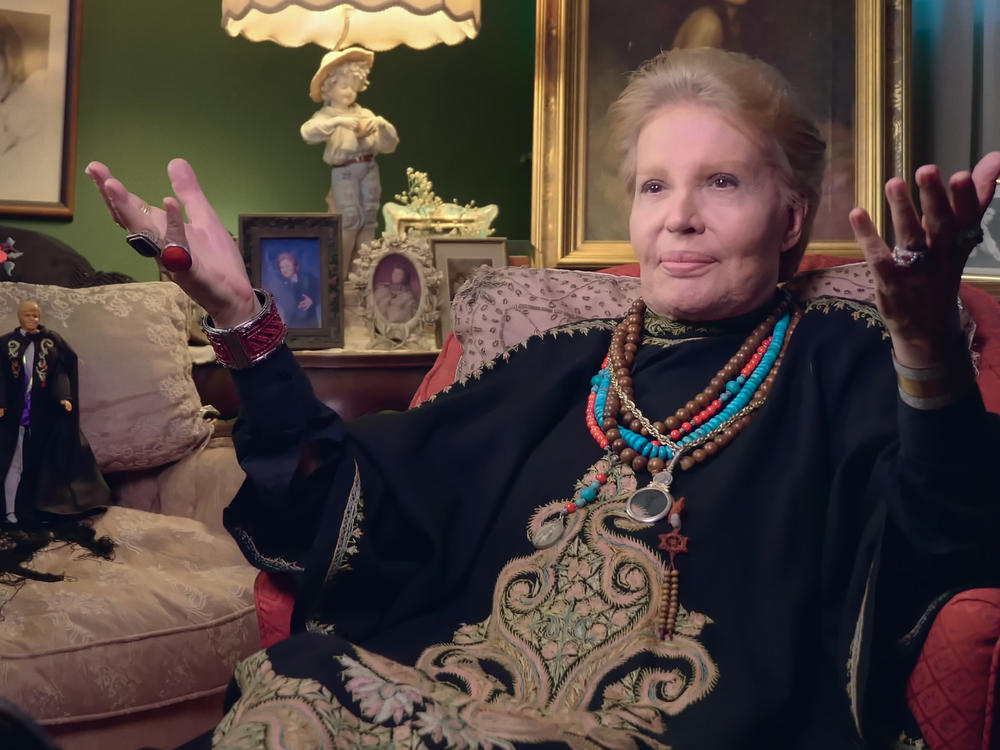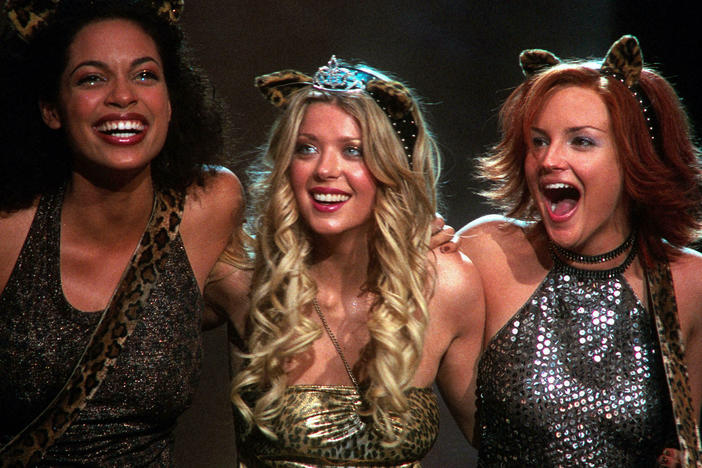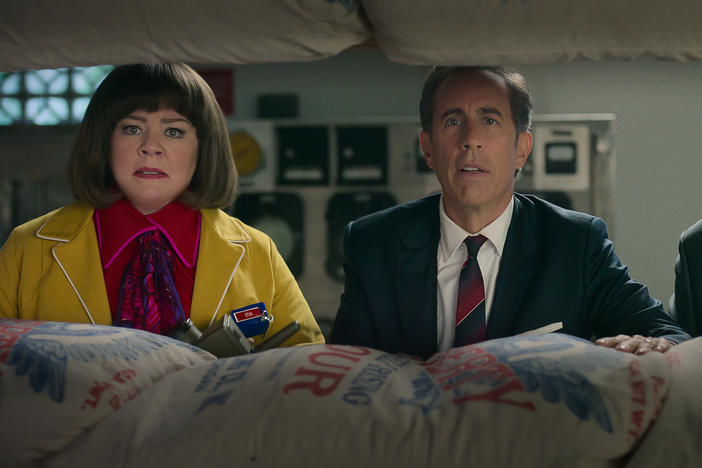Section Branding
Header Content
Walter Mercado, Remembered, With 'Mucho Mucho Amor'
Primary Content
Early in the new Netflix documentary Mucho Mucho Amor: The Legend Of Walter Mercado, actor Eugenio Derbez says that when he first saw Mercado, he couldn't decide whether he was looking at a man, a woman, or a sorcerer. The answer, of course, is that he was just looking at Walter Mercado.
Depending on how you're situated in the world, Mercado may be one of the most famous people you can think of, or a star in the broader sky of celebrity, or someone you've seen in memes, or someone you don't know that much about. If you're closer to the end of that list, let's begin here: Mercado was a hugely popular Puerto Rican TV astrologer for whom the word "flamboyant" is unavoidable, inadequate and reductive, whose multinational Spanish-language audience on television and radio from the 1970s until the 2000s numbered, according to various estimates, around 120 million.
How do you get to be a famous astrologer? Mercado recounts getting into the astrology business when, as an actor, he wore a stage costume to a television talk show to promote a play. The host asked him to do a little segment about his interest in astrology, which was so popular with the audience that they begged him to continue. And he did, and he became a legend. He did look like a sorcerer; he wore jewels and capes and heavy makeup. It's his aesthetic even off-screen: At one point in the film, he shows off to an interviewer a bracelet with perhaps five or six baseball-sized purple crystals hanging from it, and he calls it "humble." With a wink? Sure. A little one.
There have been darker and more difficult moments. Mercado spent years in a legal dispute with Bill Bakula, the manager who steered his successful campaign to break into the United States market via appearances on everything from Howard Stern's show to Sally Jessy Raphael's. The film tells the story like this: Bakula eventually gave Mercado a contract to sign — which Mercado says he didn't understand — that turned over to Bakula the bulk of Mercado's decision-making, along with the rights to his name and image. Forever. Mercado and his family (as he aged, he was watched over by both his longtime assistant and a devoted battalion of nieces) say the money from the contract stopped coming, Mercado tried to void it, and he learned that he could no longer use his own name or appear in public professionally until it was settled. It took years to resolve, during which time he had to stop working. He eventually got the rights to his name back, but never the career he once had.
Still, as directors Cristina Costantini and Kareem Tabsch spend what turn out to be some of the last months of his life with him, Mercado is able to enjoy the adoration of what feel like generational waves of fans: those who watched him in (for instance) the '80s, and those whose parents did, and those whose grandparents did. After being largely out of the public eye for quite some time, we watch as he attends a 2019 50-year celebration of his work. It turns out he's popular on Instagram, he's an only slightly ironic icon to people who blow kisses at the camera and call out his signature sign-off: "Con mucho, mucho, mucho mucho amor!" (When he says it, it ends "mucho mucho ... a-MOR!")
One who visits in early 2019 is Lin-Manuel Miranda, who came by with his father Luis when they were in Puerto Rico to do Hamilton. You have to figure Miranda had met a lot of very famous people by then, but when he meets Mercado, he's overwhelmed. It's the associations with childhood, family, home — more than one person describes having grown up in homes where one simply did not interrupt while Walter Mercado was on, because if you missed your horoscope as it went by on the forecast, you'd be out of luck.
Walter's gender presentation and sexuality are not just subtext within the film; they're text, too. Willie Acosta, Walter's assistant, calls him an androgyne and says that his gender fluidity led to plenty of jokes, homophobic and otherwise, but Walter grew accomplished at ignoring them. "Walter always takes a pill called an I-don't-care pill," Willie says, "and I started drinking that pill, too."
For the record, Willie knows what you might be wondering about, which is the nature of his elbow-to-elbow relationship with Walter. It was never physical, he says. Never. Everyone thinks it's a romance, but it's not. Walter himself declined to talk about his sexuality throughout his life, at least in the way he was often being asked. He holds to this in the film. "I have sexuality with the wind," he says at one point. "I have sex with life." Is he saying, an interviewer wonders, that he's a virgin? There is no other word for it: Mercado, in response, twinkles. "The only one in town," he says mischievously.
But whatever Walter Mercado did or didn't say about his sexuality and his gender presentation during his lifetime, his influence on queer kids — who, too, were watching him with their parents and grandparents — is clear. Karlo Karlo, a makeup artist and activist, talks about watching Walter Mercado at a time when "perception of masculinity was so square." Mercado meant something to him: "Growing up as a queer boy and watching Walter Mercado," he says, "gave me hope." Karlo adds a saying that he thinks may have defined how much of Mercado's audience — much of it conservative, much of it Catholic — viewed him: "What you can see, you don't ask about."
One of the film's real strengths is the way that even though Walter deflects questions about his sexuality and gender presentation, it's able to get at what the influence of those things, or the perception of them, might have been anyway. And it does it without seeming to disqualify himself from saying who he is, or from maintaining that his sexual feelings are mostly directed at nature, as he says a couple of times.
It's interesting that one of the things that's elided in the documentary is the astrology itself. It doesn't reveal a great interest on Mercado's part in talking about astrology outside the context of his entire approach to spirituality. He considers himself something of an alchemist who uses elements of Buddhism and Hinduism and Christianity, and he combines them with astrology to spread a philosophy he calls "interfaith religion," which he sums up thusly: "You have to be nice to people, you have to give the best of yourself every moment of your life, and you have to believe in yourself." At first, I wanted the film to talk more about what it was that made Mercado's audience so loyal to him, as they remained until his death in 2019, years after he'd left TV. But I think in large part, it was this positivity, this translation of astrology into a forecast that amounted to being reminded every day of your own worth and power, and your responsibility to be decent.
There are moments when you see a bit of the hustle that accompanies Mercado's apparently abundant sincerity. A sadder one is the recollection of his cashing in (at what we're told was Bakula's suggestion) on 900 numbers when that was a big thing; a lighter one is his explanation of some of his stagecraft. "I want to look beautiful," he says at one point. "I want to look alluring. I want to mesmerize people. I study dancing, so I use my hands." He pauses. "The people love all that kind of stupid things. So I used the stupid things to teach, to help, to serve, to give a beautiful message of love and peace."
Use stupid things to give a beautiful message of love and peace? I've heard worse philosophies of life.
Copyright 2020 NPR. To see more, visit https://www.npr.org.
Bottom Content




